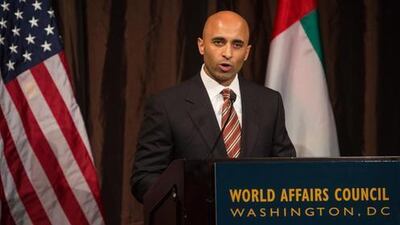A senior UAE envoy said the country's strong links with the Special Olympics movement was a celebration of the values of "respect, tolerance and acceptance" of the Islamic faith.
Yousef Al Otaiba, UAE Ambassador to the United States, stressed the Emirates shared a common vision with the global humanitarian event for a more inclusive future.
Mr Al Otaiba said it was vital that the country demonstrated the true spirit of Islam to the rest of the world - and countered misinterpretations about the religion.
The diplomat spoke during a webinar following the announcement that Sheikh Mohamed bin Zayed, Crown Prince of Abu Dhabi and Deputy Supreme Commander of the Armed Forces, had pledged $25 million (Dh91.8m) to help fund the global expansion of an inclusive education project led by the Special Olympics movement.
The firm friendship between the UAE and the Games continues to flourish after the successful hosting of the Special Olympics World Games Abu Dhabi last year.































"We learned that we share the same values (with the Special Olympics) that we have in the UAE which are inclusion, respect, tolerance and acceptance," said Mr Al Otaiba.
"These are things we grow up with, these are things we inherited collectively from our founding father Sheikh Zayed. We finally found an organisation that espouses those exact values.”
Mr Al Otaiba said it was important for the UAE and the wider Arab world to outline the founding principles of the Islamic faith, which he believes has been wrongly politicised by some.
“I think our religion and the way I understand my own religion was never about politics, was never about extremism, was never about violence and I think what we are trying to do here is take the narrative back and recapture what our religion means both to us and the rest of the world. So I think that is why we have been more vocal in the last couple of years," he said.
The UAE hosted Pope Francis in Abu Dhabi last year and is building the Abrahamic Family House on Saadiyat Island. It will be a physical manifestation of the Document on Human Fraternity signed by Pope Francis and Dr Ahmed Al Tayeb, the Grand Imam of Al Azhar, during the pontiff's visit.
"It is an attempt to recapture the reputation of our religion because so many people look at us and look at our part of the world and think, the entire part of the world is violent or the entire religion is violent, which it is not, and so I think this is what's driving what we are doing and why are trying to present to the rest of the world that religion has nothing to do with extremism and politics, it has to do with faith, it has to do with respect.
"It is important to send that message to the rest of the world from the Middle East.
“We feel that our religion has been hijacked, has been politicised, has been dominated by extremism and radicalism and has basically been misinterpreted by so many people around the world.”
Sheikh Mohamed bin Zayed's support will enable the Special Olympics Unified Champion Schools (UCS) initiative to improve even more lives all over the world.
The initiative already has a footprint in 49 states in the US and supports 285,000 pupils in more than 7,600 schools internationally.
Its programmes promote a culture of acceptance for young people of all backgrounds, including those with intellectual disabilities, through sports activities, youth leadership and other initiatives.
The the organisation will be able to operate in six more countries: Egypt, India, Pakistan, Argentina, Romania and Rwanda.
The UAE announced last year that it would roll out a UCS programme across all public schools.
"We believe in tolerance and respect. We believe everyone with or without intellectual disabilities should have access to education, to healthcare, to support,' said Mr Al Otaiba.
"Starting with the UAE and making sure all our public schools have that kind of programme in place is easy, we can make that kind of decision very quickly and very effectively and launch it like we have just done but we want to help others get to the same place.
"We and the Special Olympics have a common vision of how we want the world to look like many years from now. This programme reverse engineers by helping countries who might not have the same resources.
"These countries an important are important because it is a starting point and these countries will have an impact in their neighbourhoods. They will have the ability to influence the part of the world they are in.
"We want these countries to be the ripple from the pebble we throw in the pond and these ripples to continue. We want everyone to have the type of access to education and the skills to work in society just like everybody else."

